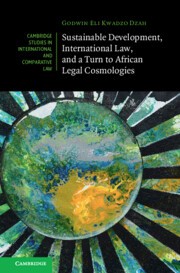Book contents
- Sustainable Development, International Law, and a Turn to African Legal Cosmologies
- Cambridge Studies in International and Comparative Law: 185
- Sustainable Development, International Law, and a Turn to African Legal Cosmologies
- Copyright page
- Dedication
- Contents
- Foreword
- Preface
- Acknowledgements
- Abbreviations
- Introduction
- Part I Mise en Scène
- Part II Universal, Pluriversal, and in Between
- Part III Thinking Alternatives
- 5 Sustainable Development and the Turn to African Legal Ontologies
- 6 Ecocosmologies, Ecolegality, and African Environmentalisms as Ecological Law
- 7 Conclusion
- Bibliography
- Index
- Cambridge Studies in International and Comparative Law
6 - Ecocosmologies, Ecolegality, and African Environmentalisms as Ecological Law
from Part III - Thinking Alternatives
Published online by Cambridge University Press: 16 May 2024
- Sustainable Development, International Law, and a Turn to African Legal Cosmologies
- Cambridge Studies in International and Comparative Law: 185
- Sustainable Development, International Law, and a Turn to African Legal Cosmologies
- Copyright page
- Dedication
- Contents
- Foreword
- Preface
- Acknowledgements
- Abbreviations
- Introduction
- Part I Mise en Scène
- Part II Universal, Pluriversal, and in Between
- Part III Thinking Alternatives
- 5 Sustainable Development and the Turn to African Legal Ontologies
- 6 Ecocosmologies, Ecolegality, and African Environmentalisms as Ecological Law
- 7 Conclusion
- Bibliography
- Index
- Cambridge Studies in International and Comparative Law
Summary
Chapter 6 expands on African legal cosmologies by demonstrating what it is that the world has missed out on by not incorporating customary law, ethics, and Indigenous norms from the Global South much earlier into the jurisprudence on sustainable development. The different senses of the legal dimensions of the concept of sustainable development as embedded in non-positivist legal traditions and thinking about law differently have tremendous potential to ensure that the sustainable development becomes effectively local, a concern that must engage the attention of international law scholars. This is where eco-legal philosophies and ecological integrity interact to found ecological law which involves reorganising the law–ecology nexus by retrenching the overbearing dominance of Eurocentric law on the planetary community and its disproportionate dominance in the humanity–nature nexus. In this respect, the renewed normativity of sustainable development as ecological integrity recalibrates law as a subset of a universal whole where law is appropriately located within, and not external to, nature. This remedial task is made possible by forging a beneficial interconnection between customary law, ethics, and Indigenous norms guided by the awareness that sustainable development reflects legal pluriversality and a significant feature of alternative legal ontologies.
Keywords
- Type
- Chapter
- Information
- Publisher: Cambridge University PressPrint publication year: 2024

